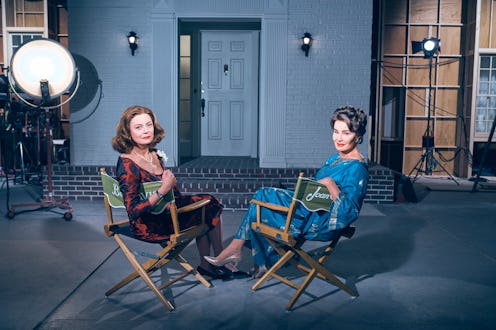
For film fans who weren't alive in the 1960s, it may seem incomprehensible that the classic What Ever Happened to Baby Jane? had a hard time getting made. Yet, movie studios did not want to invest in the Joan Crawford and Bette Davis movie, according to Ryan Murphy's new FX anthology series Feud. The show credits this extreme reluctance not on a lack of talent of either actor, but on the extreme sexism and ageism in Hollywood at the time. Watching Hollywood legends Crawford and Davis disrespected in the premiere of Feud will surely enrage their fans and also make you upset at how little the entertainment industry has advanced in 50 years.
In Feud, disgusted with the lack of roles she was being offered, Crawford searched for books that featured women to make into a film. As she sifted through books with "ladies on the cover," she lamented that there were only three categories of roles for women: Ingénues, mothers, and gorgons. Yet, What Ever Happened to Baby Jane? drew her attention for its thrilling and complex portrayal of two aging sisters, who — like Crawford and Davis — were grappling with being unwanted after immense fame. As Jessica Lange's Crawford said when she asked Susan Sarandon's Davis to be her costar:
"If something's going to happen, we have to make it happen. No one's looking to cast women our age."
That line from Crawford turned out to be disgustingly true when it was time for director Robert Aldrich to pitch the movie to film studios. One studio exec said Crawford and Davis were too "long in the tooth" and threw out Audrey Hepburn and Doris Day for the roles of Blanche and Baby Hudson, respectively. Alfred Molina's Aldrich thought he must mean Katherine Hepburn instead of Audrey because as you can see by Aldrich's face, it was preposterous to suggest Audrey Hepburn and Day. That's because they were both born in the 1920s while Crawford and Davis were born in the 1900s. But, the studio would have preferred to cast young starlets in their prime rather than the age-appropriate "has-beens" of Crawford and Davis.
The next exec acted like he was fine with the casting of Crawford and Davis, but that was because he wanted the script completely rewritten to be from the perspective of the "sexy neighbor girl." (Could you even imagine??) After all, he was looking to feature Natalie Wood, who was born in the late 1930s. Thankfully, this rewrite didn't happen and Davis' own daughter — B.D. Hyman — portrayed the small role of the "sexy neighbor girl" in the final film.
Then, Aldrich approached Stanley Tucci's Jack Warner — yes, one of the Warner Bros. — and Warner's opening volley in the show was, "Would you f*ck 'em?" Immediately, Amy Schumer's "Last F*ckable Day" sketch came to mind since Feud's Warner didn't think a woman who isn't viewed as a sex object was worth having in a movie. Besides Tucci's character's misogynistic views toward women in general, he also had a personal vendetta toward Davis for attempting to get out of her contract with Warner Bros. years earlier and causing the whole system to come "crashing down." Tucci's version of the character then goes as far as to call Davis a "c*nt" in Feud.
While the women themselves have their own issues when it comes to feminism, based on the way they tear each other down rather than lift each other up, you can see how Hollywood played a part in that since it always pitted women against each other. Rather than be excited for new actresses like Marilyn Monroe, Audrey Hepburn, Doris Day, and Natalie Wood, these younger women are viewed as competition. As Crawford showed in the very first scene of Feud, she couldn't handle being cast aside and it was easier to blame the women who were succeeding in her stead than the studios who had made it that way.
As Feud continues its run, the complex ways women are treated and how women treat each other will undoubtedly be a focus. And by shining the light on these outrageously talented, "older" actors of Crawford and Lange and Davis and Sarandon, Murphy is able to take Hollywood to task for its sexism and ageism since he's practicing what Feud is preaching — among that being that talent doesn't dissipate with age and women deserve more complex roles, regardless of how old they are.